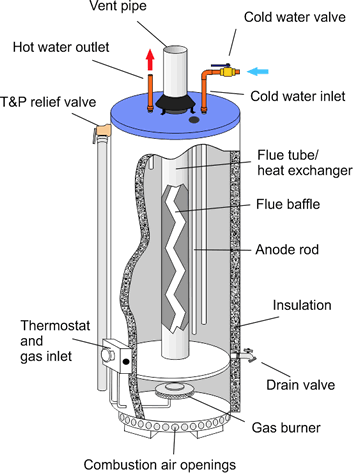
A reliable hot water tank is essential for comfortable living. Whether you're taking a warm shower, washing dishes, or doing laundry, having a consistent supply of hot water is crucial. This comprehensive guide will walk you through everything you need to know about hot water tanks, from understanding the different types to maintaining them for optimal performance.
Understanding the Basics of Hot Water Tanks
A hot water tank, also known as a water heater, is a device that heats and stores hot water for various household uses. These tanks come in various sizes and types, each with its own set of advantages and disadvantages. Let's delve into the different types available.
Types of Hot Water Tanks
- Traditional Storage Tanks: These are the most common type of hot water tanks. They store hot water in a large insulated tank, ready for use. They are typically powered by gas or electricity.
- Tankless Water Heaters: Also known as on-demand water heaters, these units heat water only when needed. They don't store water, which can save energy and space.
- Heat Pump Water Heaters: These energy-efficient units use electricity to move heat from one place to another, similar to a refrigerator. They can be more expensive upfront but offer significant energy savings over time.
- Solar Water Heaters: Utilizing solar energy, these systems use solar collectors on the roof to heat water. They are environmentally friendly and can reduce energy costs.
Choosing the Right Hot Water Tank
Selecting the right hot water tank depends on several factors, including your household's hot water needs, energy efficiency preferences, and budget.
Factors to Consider:
- Size and Capacity: Determine the right size tank based on the number of people in your household and your average hot water usage.
- Energy Efficiency: Look for tanks with high Energy Factor (EF) ratings, indicating better energy efficiency.
- Fuel Type: Decide between gas, electric, or solar-powered tanks based on availability and cost.
- Budget: Consider the initial cost of the tank and the long-term energy savings.
- Space Requirements: Ensure you have enough space for the tank, especially if you're considering a traditional storage tank.
Maintenance and Care
Regular maintenance is crucial for prolonging the life of your hot water tank and ensuring efficient operation.
Essential Maintenance Tips:
- Flush the Tank: Regularly flush the tank to remove sediment buildup, which can reduce efficiency and lifespan.
- Check the Anode Rod: Inspect and replace the anode rod as needed to prevent corrosion.
- Inspect for Leaks: Regularly check for leaks around the tank and connections.
- Insulate the Tank: Insulate the tank to reduce heat loss and improve energy efficiency.
- Adjust the Temperature: Set the temperature to a safe and efficient level (around 120°F).

Energy Efficiency and Savings
Choosing an energy-efficient hot water tank can lead to significant savings on your energy bills. Look for tanks with high EF ratings and consider tankless or heat pump options for maximum efficiency.
Tips for Saving Energy:
- Use Low-Flow Fixtures: Install low-flow showerheads and faucets to reduce hot water usage.
- Wash Clothes in Cold Water: Whenever possible, wash clothes in cold water to save energy.
- Insulate Hot Water Pipes: Insulate hot water pipes to reduce heat loss and improve efficiency.
- Schedule Regular Maintenance: Regular maintenance ensures your tank operates efficiently.
Troubleshooting Common Issues
Even with proper maintenance, you may encounter issues with your hot water tank.
Common Problems and Solutions:
- No Hot Water: Check the circuit breaker or gas supply. If the issue persists, contact a professional.
- Leaking Tank: Immediately turn off the water and gas or electricity supply and contact a plumber.
- Rusty Water: This could indicate a failing anode rod or corrosion. Flush the tank and check the anode rod.
- Strange Noises: Unusual noises could indicate sediment buildup or a failing component. Flush the tank and inspect for issues.
Conclusion
Understanding the ins and outs of hot water tanks can help you make informed decisions and ensure a consistent supply of hot water for your home. By choosing the right tank, maintaining it properly, and focusing on energy efficiency, you can enjoy years of reliable hot water service.
No comments:
Post a Comment
Note: Only a member of this blog may post a comment.